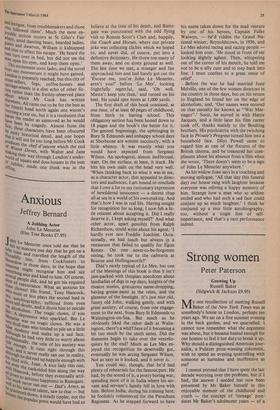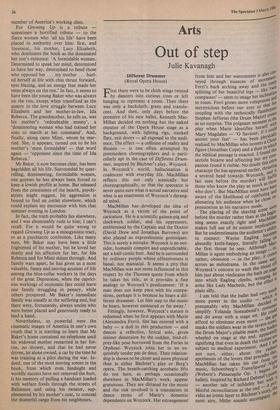Strong women
Peter Paterson
Growing Up Russell Baker
(Sidgwick & Jackson £9.95)
My one recollection of meeting Russell Baker of the New York Times was at somebody's house in London, perhaps ten years ago. We sat on a fine summer evening in the back garden, and we quarrelled. I cannot now remember what the argument was about, but it became heated enough for our hostess to feel it her duty to break it up. Why should a distinguished American jour- nalist, a Pulitzer prize-winning columnist, wish to spend an evening quarrelling with someone as harmless and inoffensive as me?
I cannot pretend that I have spent the last decade worrying over the problem, but if I had, the answer I needed has now been presented by Mr Baker himself in this enjoyable memoir of the childhood and youth — the concept of 'teenage' post- dates Mr Baker's adolescent years — of a member of America's working class.
For Growing Up is a tribute sometimes a horrified tribute — to the fierce women who 'all his life' have been placed in authority over him: first, and foremost, his mother, Lucy Elizabeth, who dominates the book as she dominated her son's existence: 'A formidable woman. Determined to speak her mind, determined to have her way, determined to bend those who opposed her ... my mother ... hurl- ed herself at life with chin thrust forward, eyes blazing, and an energy that made her seem always on the run.' In fact, it seems to have been the young Baker who was always on the run, except when transfixed as the quarry in the love struggle between Lucy Elizabeth and her mother-in-law, Ida Rebecca. The grandmother, he tells us, was his mother's 'redoubtable enemy', a 'domineering woman who had trained her sons to march at her command'. And, finally, along came Mimi, whom he mar- ried. She, it appears, turned out to be his mother's 'most formidable' — that word again — 'opponent since the time of Ida Rebecca.'
Mr Baker, it now becomes clear, has been hagridden all his life. Surrounded by quar- relling, domineering, formidable women, one guesses he has always been forced to keep a lowish profile at home. But released from the constraints of the hearth, psychi- atrists might suggest, his aggression is bound to find an outlet elsewhere, which could explain my encounter with him that summer evening in London.
In fact, the truth probably lies elsewhere, and I was abominably rude to him; I can't recall. For it would be quite wrong to regard Growing Up as a misogynistic tract, or as a psychiatric confession. Like many men, Mr Baker may have been a little frightened of his mother, but he loved her dearly and his affection for her, for Ida Rebecca and for Mimi shines through. And family wars apart, he has given us a most valuable, funny and moving account of life among the blue-collar workers in the days of the great Depression, when the caprici- ous workings of economic fate could leave one family struggling in penury, while others prospered. Mr Baker's immediate family was usually at the suffering end, but there were, fortunately, always uncles who were better placed and generously ready to lend a hand.
Nevertheless, so powerful were the cinematic images of America in one's own youth that it is startling to learn that Mr Baker's home contained no telephone until his widowed mother remarried in her for- ties, no shower, and that he had never driven, let alone owned, a car by the time he was training as a pilot during the war. In- deed, one of the most moving scenes in the book, from which even hindsight and worldly success have not removed the hurt, is his memory of pulling a handcart loaded with welfare foods through the streets of Baltimore and using his sweater, sup- plemented by his mother's coat, to conceal the shameful cargo from his neighbours.











































 Previous page
Previous page